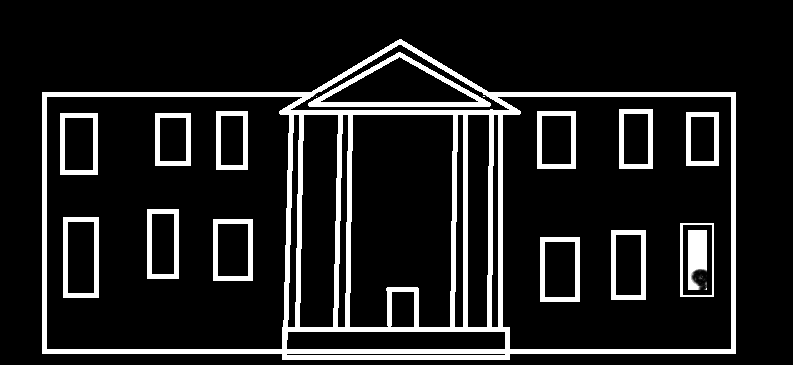
The White House at Night
The following piece provides a rare glimpse into an average night in the Trump White House. Everything that follows is based on interviews with anonymous sources, and, while some details may be incomplete or embellished, we believe that it rests on a solid foundation of fact and provides insight into a man who often can seem opaque and inscrutable and in whose hands rests the fate of a nation.
Donald Trump sits at a small table in the White House kitchen, nursing a glass of Diet Coke. All of the kitchen staff have gone home. It will be hours before they return to start breakfast. The light above the table is out. He cannot find the switch. He tried the one above the sink, only to learn that it operates the garbage disposal. He only let it run for a split second before turning it off, but he can still hear it grinding somewhere inside his inner ear as he watches the cola fizz. He drops an ice cube in the glass and thinks about his brother. Freddy never turned down a rum and coke. No self control. Disgusting. And Donald loved him, misses him every day. He had watched the autopsy of a drunk once during a sleepless night spent lost in the more obscure corners of basic cable. He remembered the liver, bloated and black. The coroner asked the cameraman to zoom in on it, to show how it was covered with bumps, hundreds of tiny pimples. He had to change the channel.
Years later, during that dinner at Jean George’s, the one his staff had arranged and Pence had insisted that he not cancel, he had looked down at the tabletop, away from the desperate pleading in Mitt’s eyes, and had noticed the two glasses of water sitting there, both unaccompanied by wine, alone and yet together. In that moment he had thought, “Maybe he’s not such an asshole. Maybe there’s something to him.” But then Romney spoke and he heard that affected, prep school drawl, that way of talking that was always inherited, never learned, and the feeling of kinship evaporated. “No,” he thought. “He’s an asshole.”
The coke was stale now. How long had he been sitting there? There was no clock on the wall. Or maybe there was. It was impossible to tell in the dark. He considered going to bed. Maybe he would try the Lincoln Bedroom tonight. He had been told it was haunted. He’d love to have a chance to talk to Abe, a decisive guy, a man who did not fuck around. Sherman’s March. Half of the South burned to the ground. And now everyone loves him for it. As they should.
He stands and pours the rest of the coke down the drain. He’s too restless to sleep. Steve always works late, he wonders if he’s still around somewhere. Bannon had cornered him in the Oval Office that morning. His face was red, too red for an hour after breakfast. (There was Freddy again, never completely out of mind.) Donald didn’t remember everything he had said, but a few lines had stayed with him:
“You’re nouveau riche. You’re the self-made man. It doesn’t matter who your father was. You’re the American Dream, what every working American aspires to be: a Big Mac on a silver platter. You’re Jay Gatsby, risen from the dead, and together we’re going to get our revenge on every one of those East Egg motherfuckers.”
He wonders if he can get Steve to say those words again. A bedtime story. It might help him sleep. But when he reaches Bannon’s office, the lights are out and the door is open. His chair is empty.
Donald wanders out onto the darkened lawn without notifying the Secret Service. He doesn’t bother to wake Keith Schiller. Soon he is sitting in a folding chair, beside the tennis court, watching the ghost of Calvin Coolidge’s teenage son play an invisible opponent. The boy is agile, a natural athlete. He returns every volley. The ball never touches the net. He thinks of Baron back in New York. He tries to imagine his son on the other end of the court where empty air faithfully returns the ball to the phantom teen, but the child conjured by his memory is blurred, a streak of flesh-colored paint holding a tennis racket with a thumbprint where its face should be.
He had never had a good memory for faces. When someone was out of his sight they disappeared from his mind, fell back into a darkness filled with familiar voices—pleading, protesting, conniving—and every voice wanted something from him, expected something. How many of them were dead now? Who cares. He tries to drown them out, to focus on the game.
He reaches into the pocket of his robe, searching for his phone. It’s not there. He grunts as he pushes himself out of the chair and returns to the house, leaving Calvin Jr. behind. As he walks away, he listens for the crack of the tennis ball against the strings of the racket, but hears nothing. When he reaches the door to the West Wing, he looks over his shoulder and sees the bleeding edge of the rising sun, just beyond the rose garden.
Inside, he finds his phone on the table in the Roosevelt Room. He picks it up and opens twitter. He begins to type, but then hesitates, unsure of what he planned to say. He deletes everything but a single word, the one he started with: “Sad.”